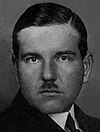The Ministry of War (Harbiye Nazırlığı or Harbiye Nezareti, often shortened to Harbiye) was responsible for war affairs in the Ottoman Empire. The Ottoman land forces were subordinate to this ministry. Within the ministry there were offices for procurement, combat arms, peacetime military affairs, mobilization, and for promotions.
After the Auspicious Incident in 1826, a modern War Ministry was established within the Serasker's department. The Ministry of War was established in 1908 after the Young Turk Revolution.
The Ministry of War was responsible for carrying out the administrative acts of the army. The command mechanism, management and administration of the army were managed by the General Staff, under the Ministry of War. [1] The Minister of War had to have the rank of pasha. The management of the Naval Forces was under the Ministry of Naval Affairs, which was established separately from the Ministry of War. After the start of the Turkish War of Independence, this ministry was replaced by the Ministry of National Defense. The War Ministry headquarters was located in the Fatih district of Istanbul and is currently used by Istanbul University.
List of War Ministers since 1908
| No. | Portrait | Minister of War | Took office | Left office | Time in office |
|---|---|---|---|---|---|
| 1 |
Ömer Rüşdü Paşa (1843–1922) | 23 July 1908 | 7 August 1908 | 15 days | |
| 2 |
Rexhep Pasha Mati (1842–1908) | 7 August 1908 | 21 August 1908 † | 14 days | |
| 3 |
Ali Rıza Pasha (1842–1908) | 21 August 1908 | 28 April 1909 | 250 days | |
| 4 |
Salih Hulusi Pasha (1864–1939) | 28 April 1909 | 12 January 1910 | 259 days | |
| 5 |
Mahmud Şevket Pasha (1856–1913) | 12 January 1910 | 29 July 1912 | 2 years, 199 days | |
| 6 |
Nazim Pasha (1848–1913) | 29 July 1912 | 22 January 1913 | 177 days | |
| (5) |
Mahmud Şevket Pasha (1856–1913) | 23 January 1913 | 11 June 1913 | 140 days | |
| 7 |
Ahmed Izzet Pasha (1864–1937) | 18 June 1913 | 5 October 1913 | 109 days | |
| 8 |
Çürüksulu Mahmud Pasha (1864–1931) | 5 October 1913 | 3 January 1914 | 90 days | |
| 9 |
Enver Pasha (1881–1922) | 3 January 1914 | 4 October 1918 | 4 years, 274 days | |
| (7) |
Ahmed Izzet Pasha (1864–1937) | 14 October 1918 | 11 November 1918 | 28 days | |
| 10 |
Kölemen Abdullah Pasha (1846–1937) | 11 November 1918 | 19 December 1918 | 38 days | |
| 11 |
Cevat Çobanlı (1870–1938) | 19 December 1918 | 13 January 1919 | 25 days | |
| 12 |
Ömer Yaver Paşa (1861–1931) | 13 January 1919 | 24 February 1919 | 42 days | |
| 13 | Ali Ferid Pasha | 24 February 1919 | 4 March 1919 | 8 days | |
| 14 |
Abuk Ahmed Paşa (1859–1923) | 4 March 1919 | 2 April 1919 | 29 days | |
| 15 |
Mehmet Şakir Pasha (1855–1919) | 2 April 1919 | 19 May 1919 | 47 days | |
| 16 |
Shevket Turgut Pasha (1857–1924) | 19 May 1919 | 29 June 1919 | 41 days | |
| (13) | Ali Ferid Pasha | 29 May 1919 | 21 July 1919 | 22 days | |
| (6) |
Nazim Pasha (1848–1913) | 21 July 1919 | 13 August 1919 | 23 days | |
| 17 |
Süleyman Şefik Pasha (1860–1946) | 13 August 1919 | 2 October 1919 | 50 days | |
| 18 |
Cemal Mersinli (1860–1946) | 12 October 1919 | 21 January 1920 | 101 days | |
| (4) |
Salih Hulusi Pasha (1864–1939) | 21 January 1920 | 3 February 1920 | 13 days | |
| 19 |
Fevzi Çakmak (1876–1950) | 3 February 1920 | 5 April 1920 | 62 days | |
| – |
Damat Ferid Pasha (1853–1923) Acting | 5 April 1920 | 10 June 1920 | 66 days | |
| 20 | Ahmet Hamdi Pasha | 10 June 1920 | 30 July 1920 | 50 days | |
| 21 | Hüseyin Hüsnü Pasha | 31 July 1920 | 21 October 1920 | 82 days | |
| 22 |
Çürüksulu Ziya Pasha (1870–1940) | 21 October 1920 | 4 November 1922 | 2 years, 14 days |
War Council
| No. | Portrait | Chief of the General Staff | Took office | Left office | Time in office |
|---|---|---|---|---|---|
| 1 |
Ahmed Izzet Pasha (1864–1937) | 15 August 1908 | 1 January 1914 | 5 years, 139 days | |
| 2 |
Enver Pasha (1881–1922) | 3 January 1914 | 4 October 1918 | 4 years, 274 days | |
| (1) |
Ahmed Izzet Pasha (1864–1937) | 4 October 1918 | 3 November 1918 | 30 days | |
| 3 |
Cevat Çobanlı (1870–1938) | 3 November 1918 | 24 December 1918 | 51 days | |
| 4 |
Fevzi Çakmak (1876–1950) | 24 December 1918 | 14 May 1919 | 141 days | |
| (3) |
Cevat Çobanlı (1870–1938) | 14 May 1919 | 2 August 1919 | 80 days | |
| 5 | Hadi Pasha | 2 August 1919 | 12 September 1919 | 41 days | |
| 6 |
Ali Fuat Cebesoy (1882–1968) | 12 September 1919 | 9 October 1919 | 27 days | |
| (3) |
Cevat Çobanlı (1870–1938) | 9 October 1919 | 16 February 1920 | 130 days | |
| 7 |
Shevket Turgut Pasha (1857–1924) | 16 February 1920 | 19 April 1920 | 63 days | |
| 8 | Nazif Pasha | 19 April 1920 | 2 May 1920 | 13 days | |
| (5) | Hadi Pasha | 2 May 1920 | 19 May 1920 | 17 days |
The British Naval Mission was led by: [2]
- Admiral Douglas Gamble (February 1909 – March 1910)
- Admiral Hugh Pigot Williams (April 1910 – April 1912)
- Admiral Arthur Limpus (April 1912 – September 1914)
French Gendarmerie Mission
French Gendarmerie Mission was led by General Moujen.
German Military Mission
Since the first attempts of Sultan Selim III to modernise the Ottoman Army, Prussia has provided it with military know-how. [3] [4] Colonel von Götze, secret negotiator of the Prussian king and military attaché, already came in 1798 on invitation from the Sultan to inspect Turkish units. [3] [4] Once Sultan Mahmud II (1808-1839), for the same purpose, abolished the old-fashioned Janissary corps in 1826, it was again Prussia who helped reform the military: future Field Marshal Helmuth von Moltke, at the time Captain of the Prussian General Staff, and Lieutenant von Berg from the First Special Regiment, were detached to Istanbul in 1835, where Moltke stayed until 1839. [3] [4] Moltke's fame led to the creation of a myth surrounding his role in the establishment of a historic relation between Turkey in Germany, where in fact his role was rather minor, his main value being in the memoirs he wrote and which became the primary lecture for all Prussian and German officers who followed him to the Ottoman Empire. [3] In 1844, Prussian Colonel Kuczkonski [probably a typo in the source, actually Colonel Fritz von Kuczkowski] arrived in Istanbul, where he helped implement secrets plans designed by the Sultan and aiming at reforming the police in the Turkish capital city. [4] Sultans Abdulmecid (1839-1861) and Abdulaziz (1861-1876) did continue reforming the Army with the help of Prussian know-how, but they preferred hiring retired officers who trained and commanded Turkish units, prominently during the Crimean War (1853-1856). [3] Finally, Sultan Abdulhamid II (1876-1908) introduced the official Prussian (German) Military Committees in the Ottoman Empire. [3] In his and Bismarck's time, Germany appeared to be the only European Power that not interested in expanding into Ottoman territory. [3] After 1880, Abdulhamid began a sustained policy of bringing German military and civilian officers to his realm, and of putting them in a leading position in the effort of reforming the Army. [3] As a result, several German officers arrived between 1882 and 1883, including Colonel Kähler as Head of Commission, followed in this position between 1883 and 1895 by Major Baron Colmar von der Goltz, who would stay in the Ottoman Empire almost uninterruptedly until his death in April 1916 in Baghdad. [3] Kähler, as aide-de-camp to the Sultan, as well as the other Germans became highly-paid Ottoman officers, but the body that paid their salaries was controlled by European bankers, and they served without cutting their ties with the German army. [3] Von der Goltz was most influential by reorganising the military education and infrastructure. [3] He was the only German officer who managed to influence Turkish generals, who viewed with displeasure the aloof attitude of Kähler's group. [3] Von der Goltz also managed to influence the decisions of the Ottomans when it came to arm deals towards buying German, rather than British weapons. [3]
The German military mission became the third most important command center (Sultan, Minister of War, Head of Mission) for the Ottoman Army.[ citation needed]
The initial contact was established during the Balkan Wars by Grand Vizier Said Halim Pasha and Minister of War Ahmed Izzet Pasha. The Kaiser Wilhelm II sent the mission of General Colmar Freiherr von der Goltz, which served two periods in Turkey within two years (8 months total).[ citation needed]
The German mission was accredited from 27 October 1913 to 1918. General Otto Liman von Sanders, previously commander of the 22nd Division, was assigned by the Kaiser Wilhelm II to Constantinople. [5] Germany considered an Ottoman-Russian war to be imminent, and Liman von Sanders was a general with excellent knowledge of the Imperial Russian Army.[ citation needed]
The Ottoman Empire was undecided about which side to take in a future war involving the German Empire, British Empire, French Third Republic and Russian Empire, eventually joining the Central Powers led by the German Empire. The 9th article of the German Military Mission stated that in case of a war the contract[ dubious ] would be annulled.[ citation needed]
References
- ^ "Genelkurmay Başkanliği-Başkomutanlik-Milli Savunma Bakanliği İlişkileri Ve Devlet Düzenindeki Konumu, Türk Hukuk Sitesi". Archived from the original on 7 September 2011. Retrieved 1 September 2011.
- ^ "The International Significance of British Naval Missions to the Ottoman Empire, 1908–1914". Archived from the original on 1 May 2014. Retrieved 1 March 2015.
- ^ a b c d e f g h i j k l m Edip Öncü, The Beginnings of Ottoman-German Partnership: Diplomatic and Military Relations Between Germany and the Ottoman Empire Before the First World War. A Master’s Thesis. Department of History, Bilkent University, Ankara, September 2003. Accessed 30 June 2019.
- ^ a b c d Orientalismus, Kolonialismus und Moderne: Zum Bild des Orients in der deutschsprachigen Kultur 1900, Springer-Verlag, p. 59, footnote 30, M&P Schriftenreihe, 2016, ISBN 9783476042583. Accessed 30 June 2019.
-
^
"Von Sanders Dies. Famous Marshal. German Commander Defended Gallipoli For Turks Against The British. Vanquished In Palestine. Began Reorganization Of Sultan's Armies In 1913. Honored By Former Kaiser".
The New York Times.
Associated Press. August 25, 1929. Retrieved 2010-07-04.
Field Marshal Otto K.B. Liman von Sanders, who directed operations against the British in Gallipoli during the World War, died on Thursday in Munich at the age of 74. ...
![Ömer Rüşdü Paşa [tr]](https://upload.wikimedia.org/wikipedia/en/d/d2/Blank.png)
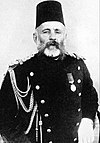


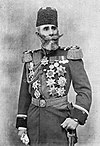


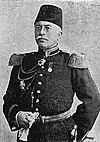


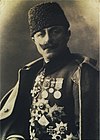


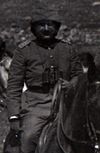


![Hüseyin Hüsnü Pasha [tr]](https://upload.wikimedia.org/wikipedia/commons/thumb/5/55/Huseyin_Husnu_Pasha.jpg/100px-Huseyin_Husnu_Pasha.jpg)
![Çürüksulu Ziya Pasha [tr]](https://upload.wikimedia.org/wikipedia/commons/thumb/c/c6/Ziya_Kutnak.JPG/100px-Ziya_Kutnak.JPG)
